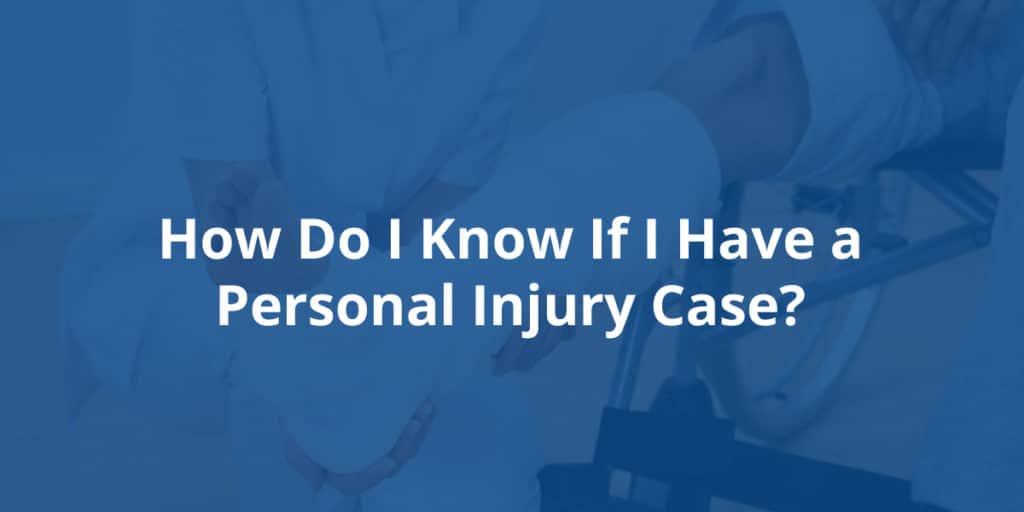
If you or a loved one has suffered some kind of significant harm in an accident that involved someone else’s obvious negligence, then it might not be so difficult to answer this article’s question. However, as we all know very well. there are many situations in which deciphering the validity of a personal injury case isn’t so easy.
If you’re in the process of trying to figure out if you have a serious personal injury case that justifies going through insurance claim filing and a potential civil court lawsuit, then there are many factors that you should keep in mind while going about your initial legal strategy decisions.
In this article we’ll go over the fundamentals of what coincides with a personal injury lawsuit, the four requirements for a valid personal injury case, other factors that strengthen these types of lawsuits, and the reasons why your personal injury case may potentially fail.
Everything in this article is crucial to take into consideration as you are figuring out what you can do about a specific injury/accident that occurred, and our team of attorneys is always here to assist you through all the hoops and bounds associated with personal injury law.
When you file a personal injury claim, you are essentially going through the legal process of enforcing you and your loved ones’ rights towards receiving your rightful compensation for any monetary damages a specific injury may have caused you.
In most situations, you’ll be seeking your rightful compensation from the insurance company of the responsible party in your personal injury case, and this is because most people have insurance policies that protect them for these exact types of scenarios. Some of the more common personal injury claims include the following:
There are many different types of injuries that can take place within a personal injury case, and this also includes a lot of different types of compensation to cover your losses. Some of the common types of re-compensation in personal injury law go towards:
In order to know if you truly have a personal injury case, you’ll need to examine the overall strength of your case, including your general rights to recover the types of compensation we listed above. It’s crucial to be able to undoubtedly prove the essential elements that are involved with every personal injury case, which usually will require the use of verified evidence and testimonies to establish the following four requirements:
These other two factors may not be considered part of the four essential elements of a personal injury claim, but they still are serious factors that you should be aware of when it comes to your overall chances of success. These factors include:
Every state is going to have different restrictions in terms of the amount of time you have to file a lawsuit in court after the date of the accident. If you do not initiate your personal injury case prior to your state’s deadline, then you are not eligible to recover compensation.
This law will generally affect the overall amount of monetary damages you’ll be able to receive within your personal injury case. This rule will ultimately focus on your own conduct and whether your actions played a role in contributing to your injuries. This essentially means that if you had any partial fault for creating the injury-inducing situation, then your compensation will be reduced by the percentage of fault a judge will attach to your actions.
Maryland, DC and the Greater Virginia Area just so happen to be three of a handful of jurisdictions that uphold contributory negligence laws, which essentially state that a personal injury victim forfeits their rights to compensation if they are found to be partially at fault for an accident’s occurrence. So what’s important to know here is that an insurance company representing an at-fault driver/individual can attempt to prove how a plaintiff in a personal injury case was in any way responsible for an accident, and essentially nullify your rights to compensation.
There have been several proposed changes to this law in Maryland to more lenient comparative negligence rules, but with contributory negligence currently remaining prevalent it becomes even more crucial to utilize the counsel of expert personal injury attorneys to help you prove that the at-fault driver was completely responsible for the accident.
It’s important to measure the overall strength of personal injury cases by also assessing the potential weaknesses that may be involved. There are several different types of flaws that can assist insurance companies in denying your injury claim.
So, you may be putting your case and yourself at a disadvantage if you:
If you or a loved one were hurt in an accident and you want to know more about the overall strength of your case then always feel free to contact us online. We’ll be able to set you up with a free consultation with one of our experts, answer your questions, and begin the foundation of your legal strategy.
Filed Under: